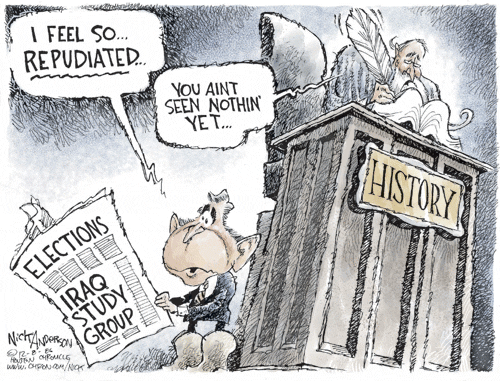Thursday, December 14, 2006
NYT: Truck Bomb Kills 70 Iraqis as the Poor Gather for Jobs

Truck Bomb Kills 70 Iraqis as the Poor Gather for Jobs
BAGHDAD, Dec. 12 — A truck loaded with bags of wheat drove up to a crowd of poor Shiites early Tuesday, lured them close with a promise of work and exploded as they gathered around. Seventy people were killed and 236 were wounded, officials said.
The attack, in a square in central Baghdad, together with bodies found by Iraqi authorities, pushed the day’s deaths across Iraq to at least 131, the highest total since a bombing killed more than 200 here last month. Shiite political leaders often point to such attacks, arguing that they, not the American military, should control security here.
The attack comes at a delicate time for the Bush administration. The White House is weighing proposals for major changes in its policy on the war. Months of escalating violence have drained support in the United States for the occupation, and left officials here and in Washington searching for a way out of an increasingly complicated war.
The Iraqi government, meanwhile, is pushing the American military to cede control of security in the capital, arguing that Iraqis know best how to protect themselves. American commanders, however, fear the Shiite-dominated government will use the predominantly Shiite army as a weapon against Iraq’s embattled Sunni minority.
The Iraqi prime minister, Nuri Kamal al-Maliki, immediately denounced the bombing, calling it the work of supporters of the former dictator, Saddam Hussein. Shiite workers, still scraping rubble out of blood-stained puddles at noon, angrily accused the United States of failing to protect them.
“The security portfolio is still being held by the Americans,” said Waleed Hussein, a hardware store owner, whose two brothers and son were wounded. “We put all this on their shoulders.”
The deepening war again drew the attention of Iraq’s Sunni Arab neighbors. On Monday more than 30 prominent Islamic clerics from Saudi Arabia called on Sunni Muslims around the Middle East to support Sunnis in Iraq against Shiites, The Associated Press reported. The clerics, most of them from Saudi Arabia’s top Islamic universities, centers of hard-line Islam, posted their statement on a Saudi news Internet site.
“After almost four years of occupation, it is clear that the aim behind this occupation is for the Crusaders and Shiites to take control of Iraq, paving the way to complete their control over the region,” the statement read, the news agency said.
The bombing in Baghdad followed a grimly familiar pattern. Day laborers, whose wages average about $11 a day, gathered in the early morning chill to wait for offers of work. Shortly before 7 a.m., a small Kia truck drove up, loaded with bags of wheat.
“The owner got down and shouted, ‘I need laborers to unload!’ ” said a worker who had been standing in the area when the blast occurred.
Just as the workers gathered, the truck exploded, scattering grain in all directions, scarring the facade of a three-story building, wounding scores of workers and gouging out a crater nearly 10 feet wide. But two hours after the blast, workers had already cleared away most of the debris.
The hardware store owner, Mr. Hussein, who was standing in front of his crumpled shop shortly before noon, piling debris into hardhats and buckets, said he thought there had been a second bomb, delivered moments later on a motorcycle, though the police did not confirm it.
The immediate aftermath was also familiar. Brothers, fathers and sons sought each other. One man, slightly wounded, repeated the name of a Shiite saint. He was grabbing at bodies in a tangled heap, looking for his brother, Maitham Ali, a 41-year-old worker who was there when the bomb went off. He found him still alive and lifted him into a car.
The wounded were taken to Kindi Hospital, which has one of the city’s primary emergency rooms, but which declined badly in recent months, said the director, Flayeh Hassan. The hospital has lost large numbers of doctors and nurses, as many middle-class Iraqis have fled the country. There is not enough money to buy basic supplies, he said.
Kadhim Thijil, a 40-year-old construction worker from the southern city of Nasiriya, said he needed stitches that were costing more money than he had. He saved his small daily earnings and sent about $30 to his family each week, he said.
The American military described the startling rescue of 23 hostages from a neighborhood in west Baghdad by Iraqi Army soldiers. Some of the captives were found in car trunks.
The military also announced the deaths of five service members, while gunmen in Mosul shot and killed a cameraman for Associated Press Television News, the news agency reported.
Also on Tuesday, the military announced it had detained the head of the Kut office of Moktada al-Sadr, a Shiite cleric, on Dec. 9. The Iraqi, whom they did not identify, was suspected of smuggling weapons and attacking American and Iraqi forces, the military said.
